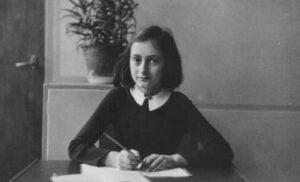
The first documentary of Anne Frank in Arabic hs been secretly screened in Iran, a country whose leaders openly deny that the Holocaust happened.
On Aug. 17, Deadline reported that Croatian film director Jakov Sedlar screened Anne Frank: Then and Now in an Iranian provincial theatre without approval from the authorities. The 85-person audience was composed of film students and their professors.
The film focuses on the lives of eight Palestinian girls and two Israelis as they read from copies of Anne Frank’s diary. The film follows the lives of the 10 girls as they try out for a role in the film. The film is in Arabic with English subtitles, the first Holocaust film to feature this format. Sedlar made the film with the intention of bringing Holocaust education to the Middle East, a place where the Holocaust is denied frequently and vehemently. The film was produced by Branko Lustig, the Croatian Holocaust survivor who won an Oscar for producing Schindler’s List.
Sedlar filmed the auditions for the documentary in 2014, the same year as the most recent active conflict between Israel and Hamas. Because of this, much of the film’s footage covers the conflict. The film has raised some controversy as it is seen to bring the Israeli-Palestinian conflict into the same narrative as the Holocaust. At one point in the film, a Palestinian girl speaks her lines while two men wearing gas masks dart for cover.
Once the screening of the film was over, Sedlar told his Iranian audience to “Tell your friends about Anne Frank… try to find details of her life; try to learn something about the Holocaust.” Information on the Holocaust is nearly impossible to find in Iran since the government explicitly denies its existence and instead calls it a conspiracy used by Zionists to gain sympathy from the international community.
In 2014, Iranian Supreme Leader Ayatollah Ali Khamenei said, “No one in European countries dares to speak about the Holocaust, while it is not clear whether the core of this matter is reality or not. Even if it is reality, it is not clear how it happened.” The Iranian regime openly denies the Holocaust, it argues that it was fabricated to give Jews credibility in their ‘claim’ to Israel. Mahmoud Ahmadinejad, Iran’s last president has openly called the Holocaust a “myth” and typically follows up calling for Israel to be “wiped off the map.”
After the film-screening the students invited Sedlar to have coffee with them, where they discussed issues surrounding the making of the film.
“They told me they were happy to have better relations with the USA,” Sedlar said. “I didn’t make picture of them because of security reasons for them.”
In Iran, filmmakers are arrested for making films that question the government, these films are considered “propaganda against the state.”
Sedlar told Deadline, “This story will never get the green light from them.” The U.S. State Department stated that the Iranian regime has full control of cinema, theatre, music, and art exhibits in its latest human rights report.
Anne Frank was a Jewish teenage girl who was one of the 6-million Jewish victims of the Holocaust. Frank wrote about her experience of being a Jew living in Nazi-occupied Amsterdam during the Second World War. Her diary outlines her life hiding with her family from the Nazis, the diary ends suddenly. The young Jewish writer died at the age of 15 in the Bergen-Belsen concentration camp, after the Nazis found her family’s hiding place.
The film is scheduled for its release in the United States in October.


